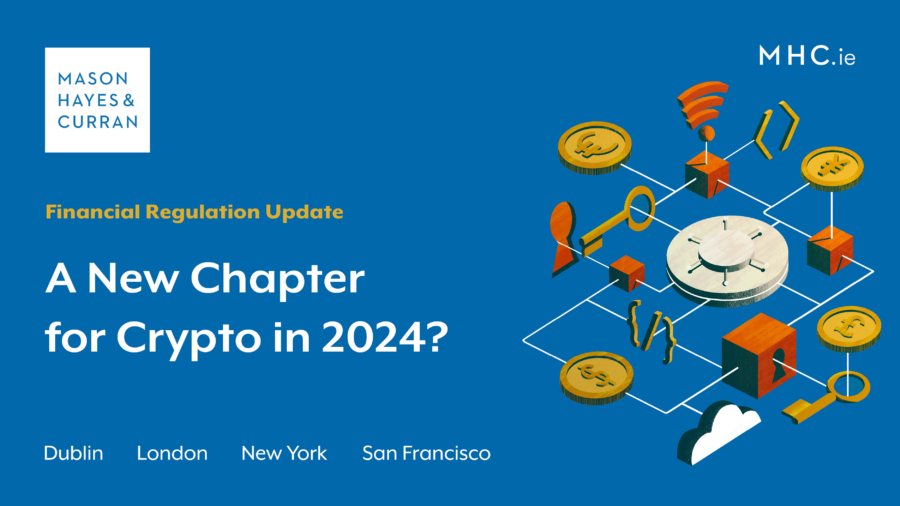A New Chapter for Crypto in 2024?

Following a turbulent period for the crypto industry in 2023, our Financial Regulation team considers the impact of recent crypto-related enforcement actions, regulatory developments and market trends in 2024 and beyond.
Since late 2022 the global crypto industry has been in turmoil. In the USA, the approach of state and federal regulators has been to vigorously pursue enforcement action against crypto firms in an attempt to eradicate bad practices. The downfall of FTX and its founder Sam Bankman-Fried has been well documented. Coupled with investigations into other big players in the crypto market, these developments have served to focus attention on the lack of oversight in the sector.
In the EU, the Markets in Crypto Assets Regulation (MiCAR) introduces a harmonised regulatory framework for crypto-assets and certain parts came into effect from June 2024. MiCAR will establish an authorisation regime for crypto-asset service providers, allowing them to passport their services across the EU which will become applicable in December 2024.
We consider the outlook for the crypto industry in Ireland and further afield in 2024.
Recent enforcement action
Globally, the number of investigations into crypto and fintech companies rose sharply in 2023. For the first time, this group was fined more for regulatory deficiencies than traditional financial institutions. Recurring issues identified by regulators included inadequacies in anti-money laundering (AML) and sanctions compliance. Most notably, the world’s largest crypto exchange, Binance, entered into a settlement of $4 billion with the US Department of Justice relating to regulatory violations, which saw its founder, Changpeng Zhao, step down as CEO.
Nonetheless, there is reason for the crypto industry to be optimistic in 2024 and beyond. The imposition of increased regulatory oversight and clearer rules on players in the industry will allow for greater certainty for crypto providers and customers alike. It is hoped that the recent penalties imposed on crypto operators, together with the introduction of stringent regulatory controls, will deter similar regulatory breaches in the future and increase consumer confidence in the market.
Perhaps this recent regulatory action has contributed to the price of Bitcoin surging in recent months to reach a high of $42,000 in December 2023. In addition, in a significant boost for the crypto industry, the SEC has approved the first US-listed stock market funds to invest directly in Bitcoin, offering investors exposure to Bitcoin without having to hold it directly.
Developments at home
Under MiCAR, a grandfathering period is available for existing crypto asset service providers providing their services in accordance with national law for 18 months. However, the Department of Finance recently confirmed in a Feedback Statement that Ireland has opted to reduce this grandfathering period to a maximum of 12 months. In addition, it confirmed that Ireland will not exercise the discretion to offer existing virtual asset service providers (VASPs) a simplified authorisation process under MiCAR.
Firms in Ireland with existing VASP registrations who intend to apply for authorisation under MiCAR will have to reach a significantly higher regulatory threshold. For example, higher levels of substance and governance will certainly be expected of MiCAR entities.
While the CBI is not mandated to foster innovation, in 2018 it established an Innovation Hub to enable fintech firms to engage with the CBI outside of its formal processes. In response to feedback received from crypto and payments firms via the Hub, the CBI announced its intention in a recent Consultation Paper to establish a Regulatory Sandbox in 2024. This will provide stakeholders with access to regulatory insight and support to help them understand the potential regulatory implications of their product or business model. The CBI states that it is expected to commence in Q4 of 2024.
As it sets about implementing MiCAR, consistent with its stated intention to foster innovation in Ireland via the Hub, it is hoped that the CBI will engage in meaningful dialogue with potential applicants. It is also hoped that the CBI will apply proportionate and sensible expectations.
Comment
The lack of a clear regulatory framework in the US, coupled with the rigorous enforcement action there in recent months, means that it is currently a challenging environment for crypto exchanges to operate in.
Consequently, Ireland should be in a strong position to, subject to the Central Bank's approach to implementation, attract firms who can apply for authorisation under MiCAR and passport their services across the EU.
The CBI is expected to open its MiCAR authorisation gateway in early Q3 of 2024 and firms are encouraged to engage with the CBI at their earliest convenience. We have extensive experience in advising crypto operators and are assisting firms who are interested in applying for authorisation under MiCAR. Please reach out to a member of our Financial Regulation or Fintech teams should you require advice and support in this area.
The content of this article is provided for information purposes only and does not constitute legal or other advice.
Share this:







